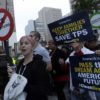Introduction
President Donald J. Trump’s own racially charged words — such as labeling Mexican immigrants “rapists”— returned to haunt him Wednesday when a federal judge temporarily blocked the administration from stripping hundreds of thousands of immigrants from “temporary protected status,” or TPS.
U.S. District Court Judge Edward M. Chen of the Northern District of California issued a preliminary injunction blocking a fast-approaching end to TPS that immigrant plaintiffs in a lawsuit were facing. The plaintiffs are challenging Trump’s termination of TPS, which has allowed some of them to live lawfully in the U.S. for as long as 20 years.
Chen said that terminating TPS status for plaintiffs as soon as next month would inflict “irreparable harm and great hardship” before the plaintiffs’ lawsuit is able to move forward through the court system.
Chen’s order affects the following groups: About 1,050 Sudanese, who were scheduled to lose TPS on Nov. 2, after 20 years; 5,300 Nicaraguans who were slated to lose TPS this coming January after 19 years; 58,600 Haitians slated to lose TPS next July after eight years; and 262,500 Salvadorans scheduled to lose TPS after 17 years. All would become undocumented immigrants.
Congress created TPS as a way for an administration to extend protection to foreign nationals of a country if they are on U.S. soil when a natural disaster or civil war or unrest erupts back home, as the Center for Public Integrity explained in prior stories.
Chen’s decision took into consideration immigrant attorneys’ arguments that multiple remarks Trump has made or alleged to have made exhibit “animus against non-white, non-European aliens” in violation of equal protection guaranteed by the Constitution.
“The issues are at least serious enough to preserve the status quo,” Chen wrote.
“As plaintiffs have catalogued,” he said, “there is evidence of such as reflected by statements made by President Trump before, during and after the TPS decisions-making process.”
“The court,” Chen added, “also notes that not only is there direct evidence of animus, but there is also circumstantial evidence of race being a motivating factor.”
When Trump publicly announced his candidacy for president in 2015, Chen noted, Trump characterized Mexicans coming over the border as “drug dealers or users, criminals, and rapists.” Trump also called for a “complete shutdown of Muslims entering the U.S.”
Among other Trump remarks plaintiffs included in their suit, Chen also observed, was an alleged comment — that the government did not clearly deny was made — wondering out loud “Why are we having all these people from s–thole countries coming here?”
The remarks reportedly occurred during a discussion with lawmakers about TPS and immigrants from African countries, Haiti and El Salvador. Trump also reportedly wondered why more immigrants weren’t coming from Norway, according to lawmakers present.
Chen also cited the immigrant attorneys’ inclusion of Trump’s comments to European leaders this summer that they “better watch themselves” with immigration and Trump’s characterization of immigration as a “very negative thing for Europe.”
In his order, Chen also considered federal officials’ email traffic and other evidence that Trump officials disregarded or “repackaged” concerns about ending TPS expressed by defense, foreign service and other career government officials.
The “record evidence,” Chen said, shows that to try to meet Trump’s “America First” viewpoint, political appointees were “repackaging” memos “to get to the President/White House’s desired result of terminating TPS.”
A memo from an agency within the Department of Homeland Security, Chen noted, referenced U.S. State Department warnings that TPS should be extended for Sudanese, and suggested that conditions for TPS were met because Sudan was not safe to return to and that armed conflict persisted. An email from a senior counselor at DHS wrote in response: “We need to repackage.”
Chen noted a Department of Defense memo expressing concerns that ending TPS for Sudanese would “negatively impact the United States from a foreign policy perspective.”
The memo, Chen’s order states, argued that the U.S. and Sudan were in a “delicate” point in a relationship that could set a course for years to come, and that “maintaining domestic and international partner support through consistent and credible messaging will be critical to achieving defense interests in Sudan.”
In another memo, a DHS official wrote that a “basic problem” over memos pertaining to conditions in crime-plagued El Salvador and other troubled countries, was that “we talk about how bad it is.”
“Our strongest argument for termination, we thought,” the official wrote, “is just that it is not bad in a way clearly linked to the initial disasters prompting the [TPS} designations. We can work …to get more, and/or comb through the country conditions we have again looking for positive gems, but the conditions are what they are.”
Following Chen’s ruling, Department of Justice spokesman Devin O’Malley, said in a statement: “The Justice Department completely rejects the notion that the White House or the Department of Homeland Security did anything improper. We will continue to fight for the integrity of our immigration laws and our national security.”
TPS recipients must go through regular security screenings at their expense and can apply to obtain work permits. Over time, both Republican and Democratic administrations have approved repeatedly continuing to provide TPS status for some beneficiaries because of ongoing instability in their countries. Trump’s administration assumed a narrow argument that if conditions directly related to a crisis that triggered TPS have improved, then TPS should be halted.
No matter how long they’ve lived here, most TPS recipients have no path to transition to legal permanent immigrant status under the current U.S. immigration system. TPS holders have been hoping Congress would create an avenue for them to earn legal permanent immigrant status—so they could finally emerge from limbo.
The biggest group of TPS holders, who are from El Salvador, are concentrated in the Los Angeles and Washington D.C. area, among other locations, as the Center has explained.
About 86,000 Hondurans also have been under TPS for about 20 years, since Jan. 5, 1999, when a deadly hurricane struck Central America. Hondurans are not plaintiffs in the lawsuit pending in California because the decision to terminate their TPS status was announced after the complaint was filed, lawyers involved in the California suit said.
Hondurans with TPS did file a similar suit, though, in May in U.S. District Court for the District of Massachusetts. It also argues that “racial animus” played a role in stripping Hondurans, Salvadorans and Haitians of TPS. Hondurans are set to lose their status in January.
In California, Chen wrote: “Many (TPS beneficiaries) have U.S.-born children; those many be faced with the Hobson’s choice of bringing their children with them (and tearing them away from the only country and community they have known) or splitting their families apart.”
“In contrast,” Chen continued, “the government has failed to establish any real harm were the status quo [to be maintained] during the pendency of this litigation.” He also said there is no evidence that allowing TPS holders to remain here under the status quo threatens “national security” or the “national interest.”
Washington, D.C. and 18 states, among them California, Maryland and Iowa, also filed briefs supporting the TPS holders and arguing that communities and economies would suffer were TPS recipients to suddenly become undocumented.
“These individuals have built lives in the United States,” the states argued. “They have started families, founded businesses, bought homes, joined churches, received degrees, and advanced in their careers.”
Chen, in his order, wrote that “the government does not dispute the practical and human hardships” terminating TPS would cause, nor has the government “taken issue” with estimates of adverse economic impact.
In Massachusetts, Sudanese Hiwaida Elarabi, one of the plaintiffs in the California suit, expressed relief at Chen’s order.
She had realized her dream of owning a restaurant, the 55-year-old said. But the Trump administration’s termination of TPS for Sudanese forced her to sell her business to prepare for the possibility that she would have to leave the country next month.
“I know it’s not the end of the legal battle,” Elarabi said of Chen’s order. “But I will be able to keep my job and maintain my status, and I will not be forced to return to that place I am afraid to go to and have not lived in for over 20 years.”
Read more in Inequality, Opportunity and Poverty
Immigration Decoded
Commentary: Trump’s immigration blame game
Migrants have long assumed costs, risks of border crossing—but Trump’s finger pointing now adds to the burden.
Immigration Decoded
ICE failed to penalize contract immigrant jails with thousands of safety and rights violations
Federal watchdog says contractors failed to report sexual assaults and staff misconduct to ICE investigators.





Join the conversation
Show Comments